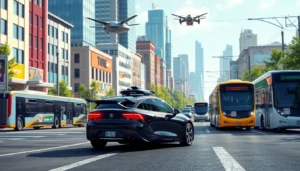Table of Contents
ToggleIn a world where your toaster might soon have a personality, emerging AI technologies are reshaping the way we live and work. Forget the days of clunky machines; today’s AI is sleek, smart, and ready to take on tasks we never thought possible. From chatbots that can hold a conversation better than your uncle at Thanksgiving to algorithms predicting your next favorite song, these innovations are not just cool—they’re revolutionizing industries.
As AI continues to evolve, it’s not just about robots taking over jobs; it’s about enhancing human potential. Imagine a future where your AI assistant not only manages your calendar but also helps you navigate life’s complexities with a dash of humor. Buckle up, because the future is bright and a little quirky, and it’s time to explore the incredible technologies that are just around the corner.
Overview of Emerging AI Technologies
Emerging AI technologies continue to reshape various industries, enabling more efficient workflows and innovative solutions. Key areas of advancement include natural language processing (NLP), which enhances machines’ ability to understand and generate human language. Significant progress in computer vision allows for improved image recognition, enabling applications in healthcare and security.
Robotics has also seen advancements, with AI-driven robots increasingly performing complex tasks. These robots excel in manufacturing and supply chain management, streamlining operations and reducing human labor costs. Machine learning algorithms further optimize data analysis and decision-making processes, allowing businesses to identify trends and make informed choices quickly.
The incorporation of AI into customer service transforms user experiences. Chatbots and virtual assistants engage customers through personalized interactions, improving satisfaction and efficiency. In education, adaptive learning platforms tailor content to individual student needs, enhancing learning outcomes.
Healthcare benefits from AI through predictive analytics, which assists in diagnosing diseases earlier. Wearable technologies that monitor health metrics offer real-time data, promoting proactive wellness management. Moreover, the integration of AI in finance enables quicker fraud detection and advanced algorithmic trading strategies.
As these technologies develop, ethical considerations become crucial. Ensuring fairness and accountability in AI systems supports responsible use. Continuous monitoring of biases in algorithms aims to prevent discrimination, fostering trust in AI applications. Emerging AI technologies promise enormous potential, significantly impacting industries and improving lives.
Key Trends in Emerging AI Technologies
Emerging AI technologies continue to redefine various industries with groundbreaking advancements. Significant innovations are evident in natural language processing, computer vision, and reinforcement learning.
Natural Language Processing Advances
Natural language processing has seen rapid advancements. Recent models, such as GPT-4, enhance conversational AI capabilities, allowing machines to engage in contextually relevant dialogues. These models differentiate between nuances in human speech, improving translation services and enabling more accurate sentiment analysis. Businesses now leverage NLP for intelligent chatbots that offer personalized customer support, streamlining interactions and boosting satisfaction. Furthermore, ongoing research in emotion detection through text analysis provides deeper insights into user experiences.
Computer Vision Innovations
Innovations in computer vision are transforming how machines interpret visual data. Algorithms now detect objects with remarkable accuracy, leading to improvements in industries such as healthcare and security. Medical imaging applications utilize these capabilities for earlier disease detection, enhancing diagnosis quality. Additionally, retail sectors incorporate computer vision to analyze customer behavior patterns, optimizing sales strategies. Real-time facial recognition technology is finding applications in security and personalized marketing. These advancements bolster efficiency and improve decision-making through visual data interpretation.
Reinforcement Learning Developments
Reinforcement learning continues to make strides in AI capabilities. Through trial and error, agents learn optimal actions to maximize rewards in various environments. This technology sees application in robotics, where machines navigate complex tasks autonomously. Video game design benefits from reinforcement learning, producing intelligent non-player characters that enhance player engagement. Furthermore, advancements in algorithmic trading employ reinforcement learning to identify profitable market strategies. These developments enable systems to adapt swiftly, offering robust solutions across multiple domains.
Impact of Emerging AI Technologies
Emerging AI technologies significantly influence various facets of life and work. Their integration into different sectors showcases the transformative potential these innovations hold.
Transforming Industries
Industries experience profound changes due to AI’s rise. Manufacturing sees increased efficiency through robotics that automate tedious tasks. Healthcare benefits from AI’s predictive analytics, allowing for timely disease detection and personalized treatment plans. In retail, customer insights gleaned from data drive targeted marketing strategies. Transportation leverages AI for optimizing logistics and enhancing safety through autonomous vehicles. Financial institutions rely on AI algorithms for real-time fraud detection, improving security measures. Each industry adapts, reflecting the versatility and efficacy of AI technologies.
Enhancing Daily Life
Daily life experiences significant enhancement through AI integrations. Smart home devices adapt to user preferences, automating routine tasks for convenience. Healthcare wearables monitor vital signs, promoting proactive wellness management. In education, AI-powered platforms tailor learning experiences, addressing individual student needs. Users engage with chatbots for immediate customer service support, receiving personalized assistance anytime. Along with offering these advantages, AI enriches entertainment through content recommendations, staying relevant to personal tastes. These daily enhancements underscore AI’s ability to improve quality of life across various contexts.
Challenges and Ethical Considerations
Emerging AI technologies present numerous challenges and ethical concerns. It’s crucial to address these issues to ensure responsible development and deployment.
Data Privacy Concerns
Data privacy remains a significant concern. As AI systems often rely on vast amounts of personal data, safeguarding this information becomes essential. Data breaches can lead to unauthorized access, harming individuals and organizations. Regulatory frameworks like the General Data Protection Regulation (GDPR) aim to protect user data, yet compliance can be complicated. Transparency in data usage also plays a vital role, as users deserve to know how their data contributes to AI functioning. Organizations must prioritize securing data through encryption and anonymization techniques to maintain user trust.
Bias and Fairness Issues
Bias in AI algorithms can result in unfair treatment of individuals. Many AI systems learn from historical data, which can reflect societal biases. Discriminatory outcomes can emerge if these biases remain unaddressed. Fairness in AI necessitates rigorous testing and continuous monitoring of algorithms to identify potential biases. Developers should prioritize diversity within training datasets to enhance model accuracy across different demographics. Addressing bias not only fosters trust but also ensures that AI technologies serve all users equitably.
Future Prospects of Emerging AI Technologies
Emerging AI technologies are poised to redefine industries in the coming years. Experts anticipate breakthroughs in machine learning applications, driving efficiency and accuracy across various sectors. Businesses can expect improved customer engagement through intelligent chatbots and virtual assistants, with advancements in natural language processing enhancing interactions.
Healthcare stands to benefit significantly from predictive analytics. Early disease detection becomes feasible as algorithms analyze patient data more effectively. Furthermore, wearable technologies will revolutionize personal health monitoring, allowing individuals to manage wellness proactively and efficiently.
Innovations in computer vision also promise to impact industries like retail and security. Advanced image recognition can streamline inventory management and enhance security protocols, fostering safer environments. Manufacturing will likely see increased automation as robotics integrate more sophisticated AI systems, optimizing production lines and reducing costs.
Education benefits from adaptive learning platforms, which tailor experiences to individual student needs. Personalized learning approaches can improve outcomes, fostering engagement and comprehension in diverse learner populations. As these platforms evolve, they are expected to incorporate more data-driven insights to enhance educational effectiveness.
Ethical considerations will remain paramount as these technologies advance. Advocates stress the importance of fairness in AI implementations to avoid bias and discrimination. Regulations such as GDPR will continue to shape data privacy practices, compelling organizations to adopt transparent data handling methods.
Overall, the future of emerging AI technologies appears bright. With continued innovation and responsible development, AI holds tremendous potential to enhance productivity, elevate quality of life, and tackle pressing challenges across various domains.
Emerging AI technologies are reshaping industries and daily life in remarkable ways. As advancements continue to unfold in natural language processing, computer vision, and robotics, the potential for enhancing human capabilities grows exponentially. These innovations not only streamline processes but also foster more personalized and engaging experiences across various sectors.
While the benefits are substantial, ethical considerations must remain at the forefront of development. Ensuring fairness and accountability in AI systems is crucial to building trust and minimizing biases. As the landscape evolves, the focus on responsible AI will be vital in harnessing its full potential while addressing the challenges that arise. The future of AI is bright, promising to enhance productivity and improve quality of life for everyone.







